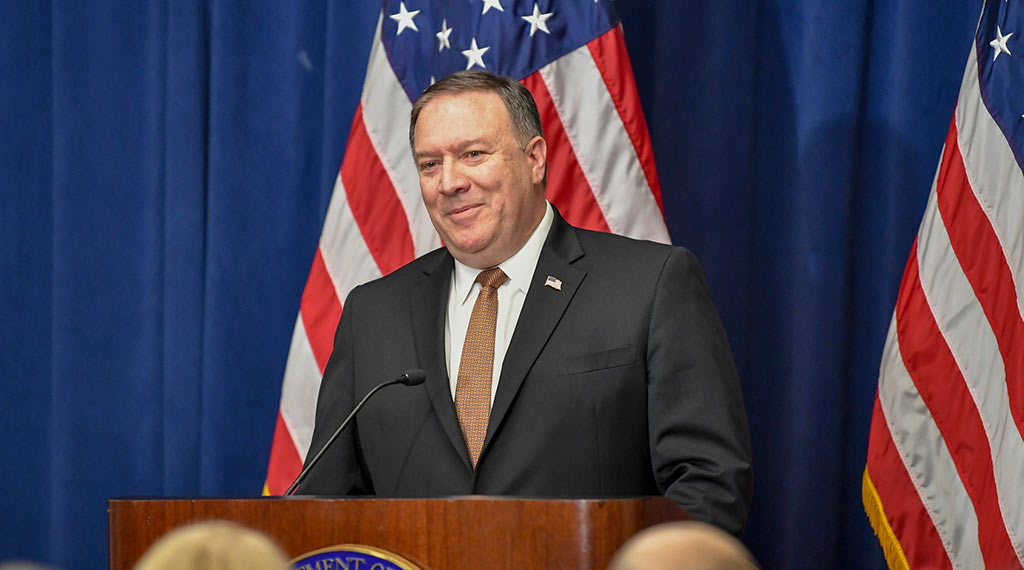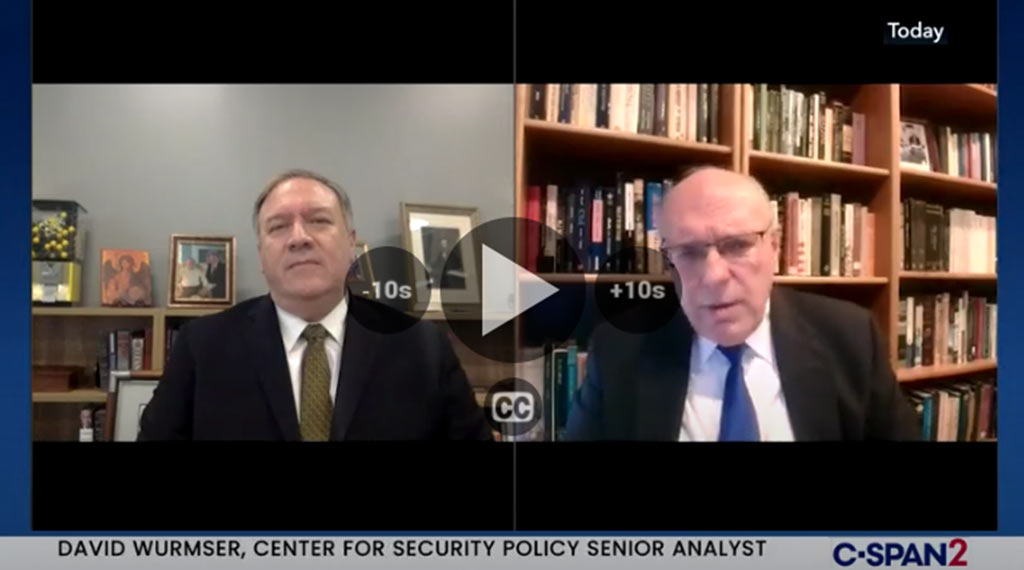Webinar: Mike Pompeo in-depth on Biden’s national security priorities

Former Secretary of State Mike Pompeo joined the Center for Security Policy for an in-depth discussion on President Biden’s national security priorities. Center President Fred Fleitz and Senior Analyst and Director of the Israel Project Dave Wurmser moderated the discussion.
Discussion began with the ongoing attacks on Israel by Hamas, and covered Iran, Egypt, China, Taiwan, and North Korea. Key parts of the discussion included the central role the Iran nuclear deal plays in Biden administration foreign policy, the Abraham Accords, China’s threat to Taiwan, and its role in the emergence of COVID-19.
Pompeo opened by noting that Obama walking away from his red line in the Middle East sent a message of weakness, so the Trump administration worked to rebuild trust, confidence, and alliances in the region.
The intent, Pompeo said, was “so we would not have to send our young kids to fight and die in that place.”
Pompeo identified three key steps taken by the Trump administration: 1) Israel had the right to defend itself and the United States would be its friend and ally; 2) Acknowledge Iran was a terrorist regime, deny it the money to run its nuclear and terror programs, and that the nuclear deal was not worth the paper it was written on; and 3) Building out the Abraham Accords and a vision for peace in the Middle East.
Pompeo emphasized how much the Biden Administration’s desire to reenter the Iran nuclear deal was impacting overall Biden administration foreign policy. The arbitrary decisions to reverse Trump administration policies on Iran, the nuclear deal, and the Abraham Accords in effect emboldened America’s adversaries and sowed the seeds for the ongoing Hamas attacks on Israel.
“By sitting in Vienna, handing the Iranians billions of dollars as the lucre to convince them to come back into this failed nuclear deal that had no chance of permanently stopping Iran from getting a nuclear weapon or a nuclear weapons program,” Pompeo said. “Remember how long it took President Biden to make the first phone call to Prime Minister Netanyahu—those actions sent signals to the Middle East, to the Iranian terrorists that are sponsored by the regime in Iran, that this is a greenlight and you see the results of this.”
Discussion also centered on China, opening with Center President Fleitz noting 28 Trump administration officials had been sanctioned and barred from entering China. On that, Pompeo joked that his son’s fiancé called the day after the announcement to ask if “she was marrying into the sanctions regime.”
Turning serious, Pompeo said there were two reasons China was coming after Trump administration officials. He noted Trump’s was the only administration in the last 40 years to call China’s actions adversarial and acknowledge it was going to have to be confronted. He pointed to theft of intellectual property, American job losses, and China’s “United Front” operations, which he said led him to close the Chinese consulate in Houston.
He noted the Trump administration’s bold stand to get countries to choose between China and the West if we are going to live in a world that abides by the rule of law, has contracts that can be honored, and non-corrupt international organizations.
The second reason Pompeo gave is China was sending a clear message to senior leaders in the Biden administration that said, “If you want to go back into the private sector and make a whole lot of money, like you were doing on Jan. 19th, you better be really careful in how you treat China while you’re in office.”
In effect, the Chinese are coercing and extorting government officials by threatening their future livelihoods. Pompeo added he is counting on Biden administration officials to “run through the stop sign.”
Pompeo also detailed his decision to designate the Uyghur persecution a genocide under the 1948 Genocide Act, a move Fleitz noted was historic and significant. He also talked about the origins of COVID-19 in China and the possibility the virus originated from experiments at a lab in Wuhan. Pompeo said the State Department, Health and Human Services, the CDC all tried to get access to information on the origins, but China stonewalled, including disappearing doctors, journalists, and imposing an information lockdown.
Questions from the audience touched on Israel, Hamas, Iron Dome, Iran, the nuclear deal, the Chinese Communist Party, the Olympics, and Taiwan.
In response, Pompeo said the U.S. needs to continue supplies for Israel, including Iron Dome. He also said we need to call out Hamas and Palestinian Islamic Jihad and the Chinese Communist Party and hold them accountable for their actions.
On the short-term impacts of the Biden administration returning to the Iran nuclear deal, Pompeo said there would be some “rich German companies, some wealthy French men, and some dead people in the Middle East.” He pointed to more terror and more risks, including Iranian assassination campaigns and threats to U.S. interests in the region. Long-term Pompeo said it would “underwrite a regime that continues to talk about fomenting violence against the Jewish people and will continue its way towards developing the tools and capabilities to have a nuclear weapons capability.” He said this will increase Iran’s coercive capabilities against Israel, its Arab neighbors, and increase the risk of nuclear weapons proliferation in the Middle East.
With respect to the Olympics, he pointed out journalists would be at personal risk in reporting on Chinese President Xi Jinping and the truth of what they see in China. He said networks broadcasting the Olympics, the journalists covering them, and businesses trying to operate in China need to ask, “Do you want to be part of the silencing machine of that surveillance state, of that genocidal regime?”
On deterring China from attacking Taiwan, Pompeo said Biden needs to send the message the U.S. will honor its commitments to Taiwan, deliver systems necessary for Taiwan to defend itself, and make clear it will keep the South China Sea open to commerce.
A transcript of the conversation can be found here:
This webinar also received extensive coverage, including on C-SPAN and Newsmax TV.
- Military Starship: How SpaceX Is About to Make America Globally Dominant - March 4, 2025
- The Cautionary Tale of Zheng He - December 4, 2024
- Frank Gaffney departs CSP after 36 years - September 27, 2024

